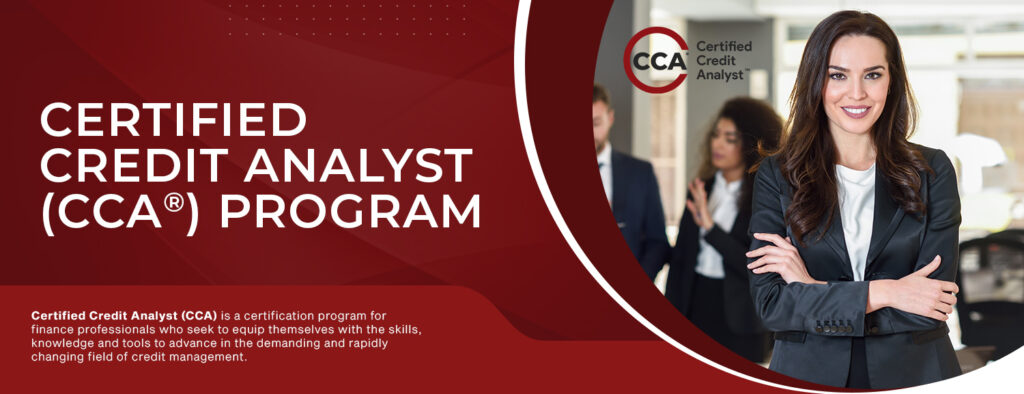
OVERVIEW
Master the Essentials of Credit Management.
Become a ®
Certified Credit Analyst (CCA®) is a certification program for finance professionals who seek to equip themselves with the skills, knowledge and tools to advance in the demanding and rapidly changing field of credit management.

Who Should Attend?
The (CCA®) Program will be of benefit to professionals in, or aspiring to, the positions of:
- Members of the treasury departments of companies who have responsibilities for managing cash flow and working capital.
- Business professionals, strategic and business development planners, and project professionals who wish to refresh their understanding and enhance their skills in managing and improving cash flow and working capital performance.
- Personnel employed in the banking, insurance and the general financial services sector where the management of cash is of prime importance
- Any operational, engineering, commercial, marketing, technical, or financial personnel whose work impacts on cash flow or working capital, and who wish to develop their expertise in these areas to support their current roles or for career development.
Body of knowledge
A Certified Credit Analyst possesses a comprehensive understanding of financial analysis, credit risk assessment, and the overall credit evaluation process. The body of knowledge for a Certified Credit Analyst typically includes the following key areas:
Financial Statement Analysis:
• Understanding and interpreting financial statements, including balance sheets, income statements, and cash flow statements.
• Analyzing financial ratios to assess a company’s liquidity, solvency, profitability, and efficiency.
Credit Risk Management:
• Evaluating the creditworthiness of individuals, businesses, or other entities.
• Identifying and assessing credit risks associated with lending or investment activities.
• Utilizing credit scoring models and credit reports to make informed decisions.
Credit Policies and Procedures:
• Developing and implementing credit policies and procedures.
• Ensuring compliance with regulatory requirements and internal guidelines.
• Establishing risk tolerance levels for different types of credits.
Industry Analysis:
• Conducting industry research and analysis to understand sector-specific risks and trends.
• Assessing the impact of economic factors on credit risk.
Legal and Regulatory Compliance:
• Understanding relevant laws and regulations related to credit activities.
• Ensuring compliance with lending and credit-related regulations.
Loan Structuring and Documentation:
• Designing appropriate loan structures based on the risk profile of the borrower.
• Drafting and reviewing credit agreements and related documentation.
Collateral Evaluation:
• Assessing the value and quality of collateral securing loans.
• Understanding various types of collateral and their implications for credit risk.
Communication and Presentation Skills:
• Effectively communicating credit decisions to internal stakeholders and clients.
• Presenting findings and recommendations in a clear and concise manner.
Risk Mitigation Strategies:
• Developing strategies to mitigate credit risk, including the use of guarantees, collateral, and risk-sharing arrangements.
• Monitoring and managing ongoing credit exposure.
Credit Monitoring and Review:
• Implementing systems for ongoing credit monitoring.
• Conducting periodic reviews of credit portfolios to identify emerging risks and trends.
Ethics and Professional Conduct:
• Adhering to ethical standards and professional conduct in credit analysis.
• Maintaining confidentiality and integrity in dealing with sensitive financial information.
Continuing Education:
• Staying abreast of industry trends, regulatory changes, and best practices through ongoing professional development and education.
